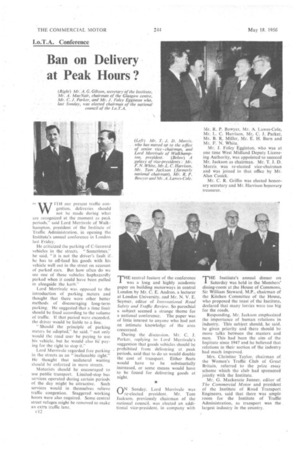11.o.T.A. Conference
Page 52

If you've noticed an error in this article please click here to report it so we can fix it.
Ban on Delivery at Peak Hours ?
i; ITH our present traffic con gestion, deliveries should not be made during what are recognized at the moment as peak periods," said Lord Merrivale of Walkhampton, president of the Institute of Traffic Administration, in opening the Institute's annual conference in London last Friday.
He criticized the parking of C-licensed vehicles in the streets. " Sometimes,he said, " it is not the driver's fault .f hehas to off-load his goods with his vehicle well out in the street on account of parked cars. But how often do we see one of these vehicles haphazardly parked when it could have been pulled in alongside the . kerb."
Lord Merrivale was opposed to the introduction of parking meters and thought that there were other better methods of discouraging long-term parking. He suggested that a time limit should be fixed according to the volume of traffic. If that period were exceeded, the driver would be liable to a fine.
" Should the principle of parking meters be adopted," he said. "not only would the road user be paying to use his vehicle, but he would also lie paying for the right to stop it."
Lord Merrivale regarded free parking in the streets as an 'inalienable right." He thought that unilateral waiting should he enforced in more streets.
Motorists should be encouraged to use public transport. Limited-stop bus services operated during certain periods of the day might be attractive, Such services would in themselves relieve traffic congestion. Staggered working hours were also required. Some central street refuges might be removed to make an extra traffic lane.
c12
THE central feature of the conference was a long and highly academic paper on building motorways in central London by Mr. C. E. Andra), a lecturer at London University, and Mr. N. V. E. Seymer, editor of International Road Safety and Traffic Review. So parochial a subject seemed a strange theme for a national conference. The paper was of little interest to anyone who had not an intimate knowledge of the area concerned.
During the discussion. Mr. C. J. Parker. replying to Lord Merrivale's suggestion that goods vehicles should be prohibited from delivering at peak periods, said that to do so would double the cost of transport. •Either fleets would have to be substantially increased, or some means would have to be found for delivering goods at night.
Sunday, Lord Merrivale was
re-elected president. Mr. Tom Jackson; previously chairman of the national council, was elected an additional vice-president, in company with Mr. R. P. Bowyer, Mr. A. Lawes-Cole, Mr. L. C. Harrison, Mr. C. J. Parker, Mr. B. R. Miller, Mr. E. H. Burn and Mr. F. N. White.
Mr. J. Foley Egginton, who was at one time West Midland Deputy Licensing Authority, was appointed to succeed Mr. Jackson as chairman. Mr. T. J. D. Morris. was re-elected vice-chairman and was joined in that office by Mr. Alan Cusick.
Mr. C. R. Griffin was elected honorary secretary and Mr. Harrison honorary treasurer.
THE Institute's annual dinner on Saturday was held in the Members' dining-room at The House of Commons. Sir William Steward, M.P., chairman of the Kitchen Committee of the House, who proposed the toast of the Institute, declared that many lorries were too big for the roads.
Responding, Mr. Jackson emphasized the importance of human relations in industry. This subject should, he said, be given priority and there should be more talks between the masters and men. This had been the aim of the Institute since 1947 and he believed that relations in their section of the industry had much improved.
Mrs. Christine Taylor, chairman of the Women's Traffic Club of Great Britain, referred to the prize essay scheme which the club had sponsored jointly with the Institute.
Mr. G. Mackenzie Junner, editor of The Commercial Motor and president of the Institute of Road Transport Engineers, said that there was ample room for the Institute of Traffic Administration, as transport was the largest industry in the country.
















































































































